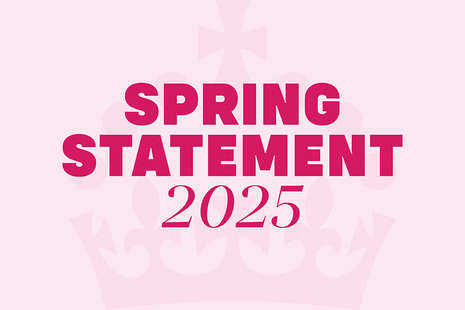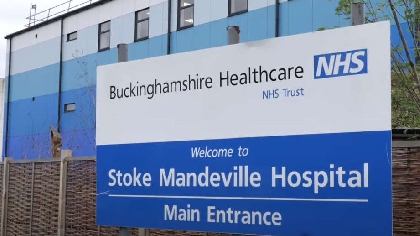
Chancellor Rachel Reeves has delivered the UK’s highly anticipated Spring Statement, unveiling a £14 billion package aimed at addressing the nation's economic challenges.
The measures introduced include welfare reforms, departmental spending cuts, increased defense investment, and a boost to the National Living Wage.
Laura Kyrke-Smith, the Labour MP for Aylesbury, expressed strong support for the Spring Statement, emphasizing its alignment with the government's "Plan for Change." She highlighted improvements in growth forecasts, disposable income, and reductions in inflation. Kyrke-Smith noted increased investments in public services aimed at reducing NHS waiting lists, enhancing police presence, and improving education. She also underscored commitments to national strength through increased defense spending and initiatives for energy security and job creation. Kyrke-Smith acknowledged that while change takes time, constituents in Aylesbury and surrounding villages can expect tangible benefits, including a projected £500 extra for each household by the final year of the current Parliament.

Callum Anderson, Labour MP for Buckingham & Bletchley, has responded to today’s Spring Statement, highlighting the Labour Government’s efforts to stabilize the economy, invest in public services, and address long-term financial challenges inherited from the previous Conservative administration.
As the Member of Parliament for Buckingham and Bletchley and a former financial markets expert, Anderson emphasized the importance of sustainable public finances and a clear strategy for economic growth. He pointed out the economic difficulties inherited from 14 years of Conservative governance, citing rising energy bills, mortgage rates, and the increasing cost of living as key challenges faced by local families and businesses.
“The Chancellor is right when she says we must continue to act decisively to secure a stable and more prosperous future,” Anderson said. “Labour was elected on a promise of delivering a decade of national renewal, and today’s announcements mark a crucial step in that direction.”
Economic Stability and Fiscal Responsibility
Anderson underscored the importance of restoring economic stability to protect working people from the adverse effects of inflation and rising mortgage rates. He noted that the government is on track to meet its stability and investment rules two years earlier than anticipated, demonstrating a commitment to responsible fiscal management.
Investing in Public Services
Highlighting improvements in public services, Anderson pointed to a steady decline in NHS waiting lists over the past five months. He reaffirmed Labour’s commitment to securing long-term funding for healthcare, education, and other essential services that directly impact communities in Buckingham and Bletchley.
Employment and Welfare Reform
Labour’s approach to employment and welfare was another key point in Anderson’s statement. He described the previous welfare system as “broken” and announced a £1.4 billion investment into employment support programs. These reforms aim to provide young people with better access to education, training, and job opportunities while ensuring that the most vulnerable members of society receive necessary support.
Fair Taxation and Tackling Evasion
Anderson reiterated Labour’s stance on fair taxation, assuring constituents that there would be no tax hikes while pledging stronger measures against tax evasion. The Chancellor’s plan to raise an additional £1 billion through anti-evasion measures is intended to ensure that public funds are used efficiently for essential services rather than lost through loopholes.
Infrastructure and Housing Investments
Addressing infrastructure and housing, Anderson criticized past Conservative cuts and reaffirmed Labour’s commitment to increasing capital spending. He pointed out that Labour’s planning and infrastructure reforms aim to alleviate the housing crisis and stimulate economic growth, potentially adding £15 billion to the economy over the next decade.
Looking Ahead
While acknowledging that challenges remain, Anderson expressed confidence in the government’s direction. “The work of change is far from over, but today’s Spring Statement is a vital step forward. With the economy stabilizing, welfare reforms underway, and increased investment in public services, we are building a more secure and prosperous future for everyone.”
As Labour continues implementing its long-term economic plan, Anderson reassured constituents that their concerns remain a priority and that the government’s efforts will translate into tangible improvements for families and businesses alike.

The Spring Statement has received a mixed response. Supporters argue that Reeves’ plan is a necessary step to stabilize public finances while maintaining key priorities such as defense and wage growth. Critics, however, claim that the cuts to welfare and overseas aid will disproportionately affect the most vulnerable. Opposition leaders have vowed to challenge the proposed welfare changes in Parliament.
As the UK navigates an uncertain economic landscape, the true impact of Reeves' fiscal strategy will become clearer in the coming years.
Welfare Reforms
The government aims to save £3.4 billion by 2029-30 through significant changes to welfare payments. Stricter criteria for Personal Independence Payments (PIP) and Universal Credit are expected to be implemented, a move projected to increase relative poverty for 250,000 people. The reforms have already sparked criticism from opposition parties and welfare advocates, who warn of potential hardship for vulnerable groups.
Departmental Spending Cuts
In an effort to balance public finances, the government will reduce day-to-day departmental spending by £3.6 billion. While specific areas affected have not yet been detailed, concerns have been raised over potential impacts on public services.
Defense Spending Increase
Despite the spending cuts in other areas, the government has prioritized national security, announcing a £6.4 billion increase in defense spending by 2027. This will be funded by reductions to the UK’s overseas aid budget, a decision that has drawn criticism from humanitarian organizations.
National Living Wage Rise
One of the more widely welcomed measures is a 6.7% increase in the National Living Wage, effective from April 1, 2025. This increase translates to an annual pay rise of approximately £1,400 for three million workers, providing much-needed relief amid the ongoing cost-of-living pressures.
Economic Outlook
The Office for Budget Responsibility (OBR) forecasts modest economic growth of 1% in 2025, with an expected rise to 1.9% in 2026. Inflation is projected to stand at 3.2% in 2025, suggesting a gradual easing of the cost-of-living crisis. However, economists warn that the combination of spending cuts and welfare reforms could have broader economic and social repercussions.



 Amersham resident donates trainers to installation in dad's memory
Amersham resident donates trainers to installation in dad's memory
 Aylesbury Community Big Dig
Aylesbury Community Big Dig
 The Clare Foundation invites Buckinghamshire charities to apply for Angels' Den 2025
The Clare Foundation invites Buckinghamshire charities to apply for Angels' Den 2025
 Local Resident is Awarded an Honorary Doctorate
Local Resident is Awarded an Honorary Doctorate
 Trust A&E moves into the Top 20 performers in the country
Trust A&E moves into the Top 20 performers in the country
 Mursley Community Launches Inclusive Play and Exercise Area
Mursley Community Launches Inclusive Play and Exercise Area
 Youth Concern named Waddesdon and Rothschild Foundation’s 2025 Charity of the Year
Youth Concern named Waddesdon and Rothschild Foundation’s 2025 Charity of the Year
 Wild about Gardens campaign invites us all to become hoverfly heroes
Wild about Gardens campaign invites us all to become hoverfly heroes












